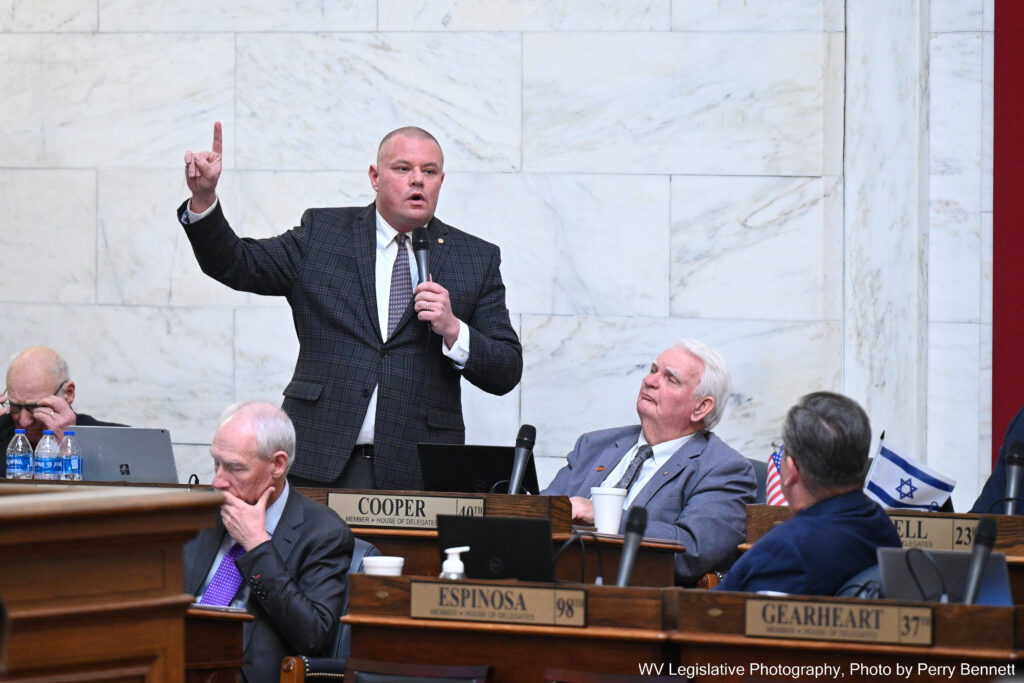The legislature is getting close to the end of session and there is a race to get all bills out of their chamber of origin by Wednesday. Nearly 2600 bills have been introduced this session, but fewer than 50 have completed legislation so far.
The House of Delegates worked through more than 30 bills on third reading Tuesday. Proposals included water service cut offs, banning mugshots, helping veterans and outlawing deep fake election material.
Keeping your water running was key to Senate Bill 631. The measure prohibits municipalities from disconnecting water service for nonpayment of stormwater fees. There are some protections and exemptions.
The sponsor of the bill, Del. John Hardy, R-Berkeley, said his research showed that some communities are over zealous in fee collection vs. disconnecting a family’s water supply,
“Some of the municipalities have encumbered some of that stormwater money into their bond agreements and their bond declarations,” Hardy said. “So we felt like this would be a fiscally responsible way to make sure that we’re taking care of the municipalities, but still giving some relief to our constituents who are in some of these municipalities who are acting very heavy handedly.”
The bill passed 99-0 and goes back to the Senate.
House Bill 4621 is known as the mugshot bill. It bans the Division of Corrections and Rehabilitation from posting booking photographs of an accused person. The bill denies the release of mugshots, with some public safety exceptions, until a person is convicted of the crime, instead of upon arrest.
Del. Brandon Steele, R-Raleigh, opposed the bill. Steele said making mugshots public upon arrest protects and safeguards the defendant, the public and victims.
“The whole purpose of a mugshot is twofold,” Steele said. “One, to inform the public of what’s going on in their community, to let people know who’s in custody and why they’re in custody and what they’re charged with. The other thing is to protect the defendant, so that the defendant, that the world knows that that defendant is in custody.”
Del. Larry Rowe, D-Kanawha, was one of many who supported the bill. Rowe said when the media and third party websites and magazines post and publicize mugshots before conviction, they prejudge a person who is still innocent until proven guilty.
“This really poisons the jury pool,” Rowe said. “It has a major effect, because people will be watching and saying. What we’re about is protecting individual rights against the mob. While the mob is on the side of publishing these photographs, it’s not on the side of protecting people from being embarrassed and having their reputations ruined, without ever having been found guilty beyond a reasonable doubt.”
After lengthy debate, the mugshot restriction bill passed 54-46 and now goes on to Senate consideration.
House BIll 4882 extends in-state tuition rates to all members and veterans of the National Guard, reserves, and armed forces as well as their spouses and dependents.
Del. Ric Griffith, D-Wayne, was among many supporting a bill he said will invigorate the state and its economy.
“We have the lowest return rate of any state in the union of our discharge veterans,” Griffith said. “And one of the concerns that was expressed as people were discussing this is that that’s going to cost our institutions of higher learning. They’re badly needed out of state tuition. Well, to that, I think all of us feel strongly about this and realize these people aren’t coming if we don’t do this.This will bring people home.”
The bill passed 98-0.
House Bill 4963 is one of several AI bills proposed this session. It prohibits the use of deep fake technology to influence an election. Deep fake AI goes beyond photoshop, defined as an artificially produced audio, video or photo so realistic a regular person can’t tell it’s fake.
The bill was sponsored by Del. Josh Holstein, R-Boone. He said certain voters are especially susceptible to false images and especially voices, in campaign ads.
“If I were attacked, and I was in a primary campaign against me with somebody of the opposing side, their image behind me, that wouldn’t be necessarily a deep fake,” Holstein said. “But if somebody had remarks attributed to me that they played on an ad, using my voice that’s created with an artificial intelligence audio maker, and they say that I support this candidate or I support this legislation, which is false, and it’s a replica of my voice, that would be a deep fake. So that’s the intent behind this.”
The deep fake election restriction bill passed 88-11.




















